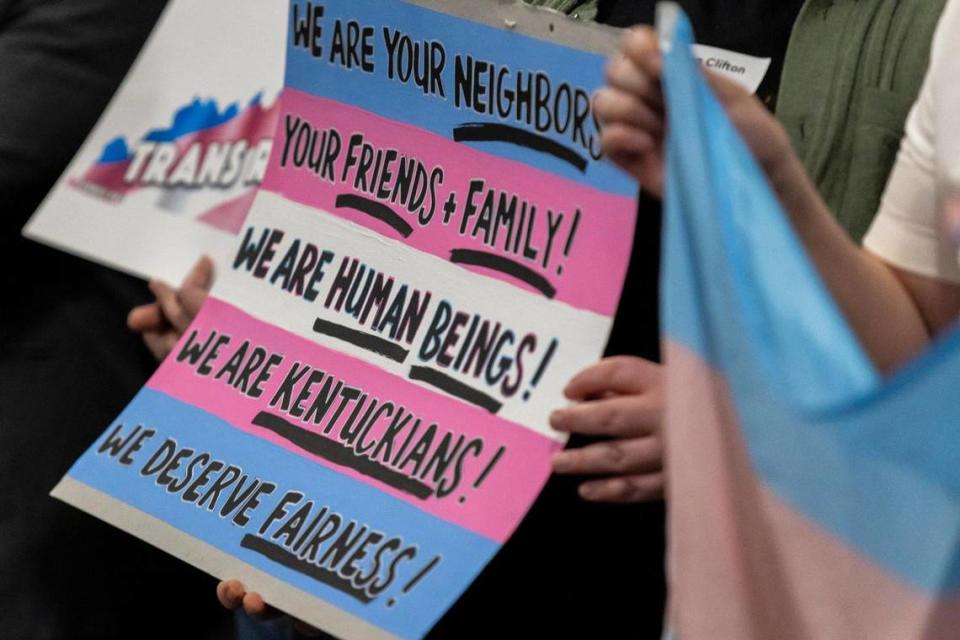GOP advances bill opponents say would pave the way for discrimination of LGBTQ Kentuckians
A Republican-backed “religious liberty” bill opponents say would weaken local governments’ ability to enforce Fairness Ordinances and embolden individuals who wish to discriminate based on religious beliefs won approval from a legislative committee on Wednesday.
Rep. Steve Rawlings, R-Burlington, told the House Judiciary Committee that House Bill 47 would codify into the existing Religious Freedom Restoration Act that a government cannot “substantially burden” an individual’s freedom of religion, and assure that Kentuckians are “free to live and work according to their faith without fear of being unjustly punished by their government.”
In short, his bill would formalize definitions of what it means to have one’s religious liberty substantially burdened by government, and add private right of action steps an individual can take to seek damages should this happen.
The definition of “substantially burden” would include “any action that directly or indirectly constrains, inhibits, curtails or denies the exercise of religion by any person, or compels any action contrary to a person’s exercise of religion,” including but not limited to:
Withholding benefits
Assessing criminal, civil or administrative penalties
Excluding from governmental programs or access to governmental facilities.
By formalizing these definitions in law, Rawlings said, it will “ensure that Kentuckians can be heard if any part of the government burdens their religious practices.”
The bill would apply to all state and local laws, administrative regulations and ordinances, and it would allow any individual who believes their religious liberty has been infringed upon to seek injunctive or declaratory relief, as well as compensatory damages.
Bill detractors, including Fairness Campaign Executive Director Chris Hartman, warned the proposal would make it easier to discriminate against LGBTQ Kentuckians, and potentially shield those who refuse to enforce local fairness ordinances, which outlaw LGBTQ discrimination in employment, housing and other public accommodations. Lexington and Louisville were the first cities in the commonwealth, in 1999, to adopt Fairness Ordinances. A total of 24 municipalities have adopted similar measures in the years since.
The committee voted 14-6 to advance the bill to the House floor. Republican Reps. Kim Banta, R-Ft. Mitchell, and Stephanie Dietz, R-Edgewood, joined Democrats in voting against the bill. It now heads to the House for floor votes.
Rep. Nima Kulkarni, D-Louisville, said the reality is, “we live in a very litigious society, and we live in a society where discrimination exists. The legislation we’re voting on is over-broad and unnecessary” and would “weaken protections we have for some of our most vulnerable.”
Freedom to exercise religion, Kulkarni said, “does not mean the freedom to discriminate.”
But Rawlings insisted his bill is “not about discrimination. It’s about protection.”
But protection of whom, opponents asked.
Rep. Keturah Herron, D-Louisville, who voted against the bill, said lawmakers who support it “need to be careful” not to open the door in statute that tells a person, “based on your religious belief, you can discriminate. Basically that’s what this bill says.”

Rawlings implied this was a mischaracterization of that bill, but didn’t deny that could be a possible outcome.
“My intention was to protect people of faith to be able to practice their religious beliefs,” he told Herron. “I’m sorry you feel that way about it.”
Hartman, who spoke in opposition to the bill, said freedom of religion is already a strongly protected constitutional right at the state and federal level.
“What is it that’s not currently working with this act? What makes it so necessary to expand this?” he asked, calling it, “nothing but a jackpot justice law for the Alliance Defending Freedom.”
Alliance Defending Freedom is a national right-leaning organization that has provided legal counsel and policy guidance on conservative-backed measures, including state efforts to restrict transgender rights, abortion and protect individual religious liberty.
Greg Chafuen, legal counsel for Alliance Defending Freedom, spoke alongside Rawlings on Wednesday as he presented his bill.
Chafuen said that by clearly defining what it means to have one’s religious liberty substantially burdened, it “answers the questions of: “what do you do when a state law is imposed in a way that stops someone from exercising their religion? What is the balance for the state’s interest in imposing its laws and your citizens’ right to exercise their religion?”
He added, “It just gives people a fair day to bring their cases to the court.”
But Hartman of the Fairness Campaign said religious freedom, and the mechanism through which a person can seek damages for that freedom being violated, is already well established in the state and federal constitutions.
Hartman called Alliance Defending Freedom a “national interest group that seeks to fleece Kentucky out of millions of tax dollars while weakening civil rights laws by traipsing about our state to sue every city and county that has a Fairness Ordinance.”
He added that this bill will allow the organization to “cash in on our tax dollars to subvert the civil rights protections that we started passing a quarter of a century ago.”
Fairness Campaign rally
A few hours after HB47 was approved in committee, Lt. Gov. Jacqueline Coleman told a crowd of a few hundred gathered in the Capitol rotunda, “to be frank, it shouldn’t be this hard” to maintain laws that guarantee LGBTQ Kentuckians won’t be discriminated against.
“If you don’t hear anything else today, please hear me when I say that we cannot build a better Kentucky for anyone unless we’re willing to build a better Kentucky for everyone,” she said to applause. “You are not expendable, and you are not invisible. What you are is our family (and) human beings deserving of acceptance and love.”
Gov. Andy Beshear, a Democrat, introduced himself as the governor who vetoed Senate Bill 150, a divisive and controversial bill passed into law last year by Republicans that bans gender-affirming health care for transgender youth, restricts classroom teaching on gender and sexuality, stops districts and schools from asking teachers to use a trans student’s pronouns, and mandates districts create policies that prevent trans students from using restrooms or locker rooms that align with their gender identity.

“I would do it again today,” Beshear said of his veto. And should HB47 pass into law, he vowed to have his “veto pen ready.”
Beshear called on the state to pass a statewide Fairness Ordinance, and said it was “unacceptable and un-American” to discriminate against LGBTQ people. “Diversity is an asset. Diversity is never a liability,” Beshear added.
May O’Nays, a Lousiville-based drag queen who has publicly opposed mirror bills — House Bill 402 and Senate Bill 147 — filed by Republicans to restrict drag performances, said inclusion doesn’t have to be a scary thing.

“I leave here optimistic that we can all change the hearts and minds of the folks using legislation that will harm my fellow LGBTQ siblings in Kentucky,” she said. “But if not, we also know how to fight like hell.”

